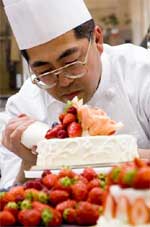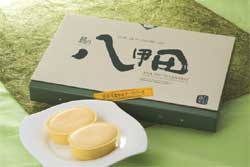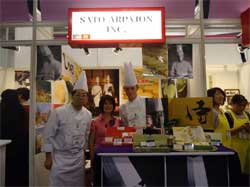Reports and Statistics
Challenge! International Business - Instilling patisserie with the soul of Japan: Pastries and sweets inspired by the Aomori climate
April 2012
Arpajon has succeeded in making a name for itself as a patisserie in Aomori, a prefecture known for its natural beauty and its agricultural and marine products. Guided by the concept of "appreciating the natural bounty of Aomori," Arpajon is looking to find a global market for its range of handmade baked cheesecakes and other sweets that have a focus on local, seasonal ingredients.
A passion and obsession with quality
Blessed with a rich natural environment that includes Mount Hakkoda and the Shirakami mountain range, Aomori faces the ocean to the north, east and west and is famous for its apples and scallops and other locally harvested agricultural and marine products. Located in the southeast of Aomori, the city of Hachinohe is a fishing port that sits on the border of Iwate prefecture and is known for the high quality of its squid, mackerel and other seafood products. It is also home to Arpajon, a local patisserie with its sights on the world. Kazuharu Matsusaka, its president and founder, is a native of Hachinohe. Mr. Matsusaka trained in France before returning to Japan where he honed his skills as a pastry chef at a foreign-owned hotel in Tokyo. He returned to Hachinohe in 1992 where he founded Patisserie Arpajon, a business he incorporated two years later.
Today, the company has five shops in Aomori. The company produces 80 different "fresh" cakes (using fruits, creams, etc) , 100 different baked goods (longer-lasting types) and 30 varieties of chocolate. Each product is made from the highest quality ingredients, all of which have been checked by Mr. Matsusaka himself to establish how the ingredients are produced and transported. Arpajon has created a lineup of products for overseas markets that is headlined by its signature "Asa no Hakkoda" baked cheesecakes and is looking to take its brand global. Its cakes are made to order with great care and attention, not mass-produced. The company has garnered extensive coverage from the Japanese media and it has a growing fan base for its products, which are available by mail order and online. Asa no Hakkoda baked cheesecakes are frozen and must be defrosted before eating. Stored in a freezer, these cheesecakes will keep for up to 180 days. This method of production offers Arpajon a workable solution to the problem of best-before dates, which can be an obstacle to exporting fresh produce overseas.
Guided by a product concept that expresses the company's appreciation for the bounties of Aomori's natural environment: the snow melting under the warm rays of the sun in the springtime, the mountain streams flowing gaily through green forests and pastures in summer, the beauty of the autumn foliage in the fall and the return of nature's harshness in winter. As a native of the prefecture, Mr. Matsusaka believes that it is his mission as a pastry chef to communicate the Aomori spirit to people throughout Japan and the rest of the world. He is developing and marketing a range of "sweets born from the dietary cultures and natural ingredients of Japan" for the international market that will substitute "Aomori" for "Japan" in promotional materials.

Mr. Matsusaka at work

Opening a window onto the world
"My goal is to incorporate world-class technologies into the pastries and sweets we produce", says Mr. Matsusaka, who already had his sights on the global market in the mid-1990s when the company had only been launched. Mr. Matsusaka hired Dutch pastry chef Marco Jonker through the French Confectionary Assocation/Syndicat du Chocolat (France). The Dutch chef has quickly become Mr. Matsusaka's right-hand man.
The opportunity to begin exporting came in 2007 when a Chinese buyer looking to source Japanese products ahead of the World Expo in Shanghai (which took place in 2010) visited the Arpajon patisserie in Aomori. The buyer had heard about Asa no Hakkoda baked cheesecakes and was anxious to stock this product. Negotiations went smoothly and the Chinese buyer proved amenable to Arpajon's request to avoid a marketing strategy that would involve selling Arpajon sweets alongside rival products. That year, it opened two branches in Shanghai: one inside the Yaohan Department Store and the other inside the GL Japan Plaza. The two Shanghai outlets carried two other products in addition to the Asa no Hakkoda baked cheesecakes: Kohaku, an Aomori-style camembert cheese tart, and Banryoku, a seasonal take on the Asa no Hakkoda baked cheesecake that is flavored with fragrant powdered green tea, and sales were initially brisk. However, an outbreak of the highly infectious foot-and-mouth disease in Japan in 2010 led China to impose a temporary ban on imports of dairy produce from Japan one week ahead of the World Expo leaving Arpajon no choice but to withdraw from the Shanghai market. This experience prompted Mr. Matsusaka to begin looking for ways of cultivating a sales network for Arpajon products overseas.
Arpajon participated actively in various foreign exhibitions and trade gatherings, including Food Expo, a trade fair that is held annually every August in Hong Kong. It was approached by a Taiwanese company during a trade fair held in Taipei in February 2011, as the result of which deal Arpajon began exporting the three products that had sold so well in Shanghai in August. In addition to over-the-counter sales, the company found a considerable mail-order market for its sweets in Taiwan. Arpajon's Taiwanese buyer has a twice-weekly slot on a shopping channel show and a September appearance by Mr. Matsusaka resulted in 15 million yen's worth of sales in 40 minutes. The company received an additional 4 million yen in orders in December and its business with Taiwan has continued to grow steadily, a fact that has made a significant contribution to the revival of the company, which sustained some damage as the result of last year's earthquake and tsunami.
Mr. Matsusaka, who has been tireless in his efforts to expand into foreign markets, has focused on two factors in pitching his company's products to foreign buyers. The first lies in the "importance of maintaining the Japanese sensibility." Whilst efforts to develop products that meet local needs and correspond to the tastes of local consumers are a given, the products conceived by Arpajon consistently emphasize Japanese sensibilities: the quiet, undeclared beauty and transience of the wabi-sabi aesthetic and the beauty of form. At the same time, Mr. Matsusaka acknowledges that it is not necessarily possible, or advisable, to attempt to introduce Japanese traditions, its cultures, manners and other virtues, to foreign markets without making some adjustments to suit foreign tastes. In devising promotional strategies to entice local consumers, he explains, it is necessary to study the particulars of the local market, Taiwan's mail-order market being a good example of how this strategy works in practice.
The other element is the need for flexibility. Whilst this might appear to contradict the first point, Mr. Matsusaka believes that a company must be flexible enough to consider jettisoning its product concept. He concedes that a foreign partner may not be capable of grasping the concept behind Arpajon's products, that it may be necessary to consider mass production. If the deal represents a major opportunity for the company, he argues, one must be willing to set aside company priorities and establish a new brand overseas. It is simply a matter of undertaking thorough research into foreign markets and having the flexibility to respond to the needs and/or demands of foreign partners, he reports; there is no need to stress over foreign deals.
Then again, trade procedures per se can prove quite problematic. In dealing with a country that employs different commercial practices, the practical details of contracts, the cash recovery process and other specifics continue to be highly confusing. Currently, Arpajon is conducting its overseas business through an Aomori-based trading company. In trading indirectly, however, there are limits to the extent to which it is possible to communicate the company's concept and the desires of its president, and Arpajon is determined to recruit and train personnel with the knowhow that will enable it to compete with a specialist trading company preparatory to dealing directly with its foreign buyers.
Research into foreign markets will continue
Mr. Matsusaka is currently focused on the markets of Europe and the United States. In September last year, Arpajon made use of a JETRO program to participate in an exhibition and spot sale event that was held at a Japanese-Korean supermarket in Los Angeles. The event was designed to provide an opportunity to study (monitor) the reactions of local consumers to Aomori products. It involved those companies in a group made up of fifteen Aomori-based companies with an interest in exporting overseas that have a particular interest in exporting to Western markets. At the event, Arpajon's Asa no Hakkoda baked cheesecake met with a favorable reception among middle-class and health-conscious consumers who expressed their appreciation for this rich tasting low calorie dessert.
Mr. Matsusaka has been watching the US health boom for some time now. Having gained the necessary evidence that there is a demand for wholesome, healthy products among American consumers from last year's monitoring survey, he has now decided to target the American market. He is currently working on a series of new products for European and American consumers that will contain tofu, powdered green tea and other healthy Japanese ingredients that have gained adherents in the West. Arpajon exhibited at the Winter Fancy Food Show in San Francisco in January. This event offered the company the opportunity to monitor the reception of existing products in the American market. Mr. Matsusaka hopes to link their recent findings to the development of new products for US consumers.
Originating from the West, a baked cheesecake made using ingredients born from the dietary cultures and climate of Japan is preparing to spread its wings and fly across the globe. The day on which a baked cheesecake packed with the taste of Japan finds fans the world over cannot come soon enough.

Mr. Matsusaka (left) and pastry chef, Marco Jonker (right) in the Arpajon booth at the Fancy Food Show
Yoichiro Taki
JETRO Aomori
Established in 1994 (founded in 1992)
General Director: Kazuharu Matsusaka
Capital: 3 million yen
Address: 2-1-25 Shimonaga, Hachinohe, Aomori
Scope of Business: Maker and purveyor of cakes and sweets
Number of Employees: 25 (including temporary and part-time workers)
Sales: 320 million yen
Related Report (Video)
<Special Program on Tohoku>
In Search of Ways to Export Sweets after the Great East Japan Earthquake
In this special program, we report on companies in the Tohoku region that were severely damaged by the Great East Japan Earthquake and on their efforts to export their products. These companies produce handmade sweets using local food materials.



